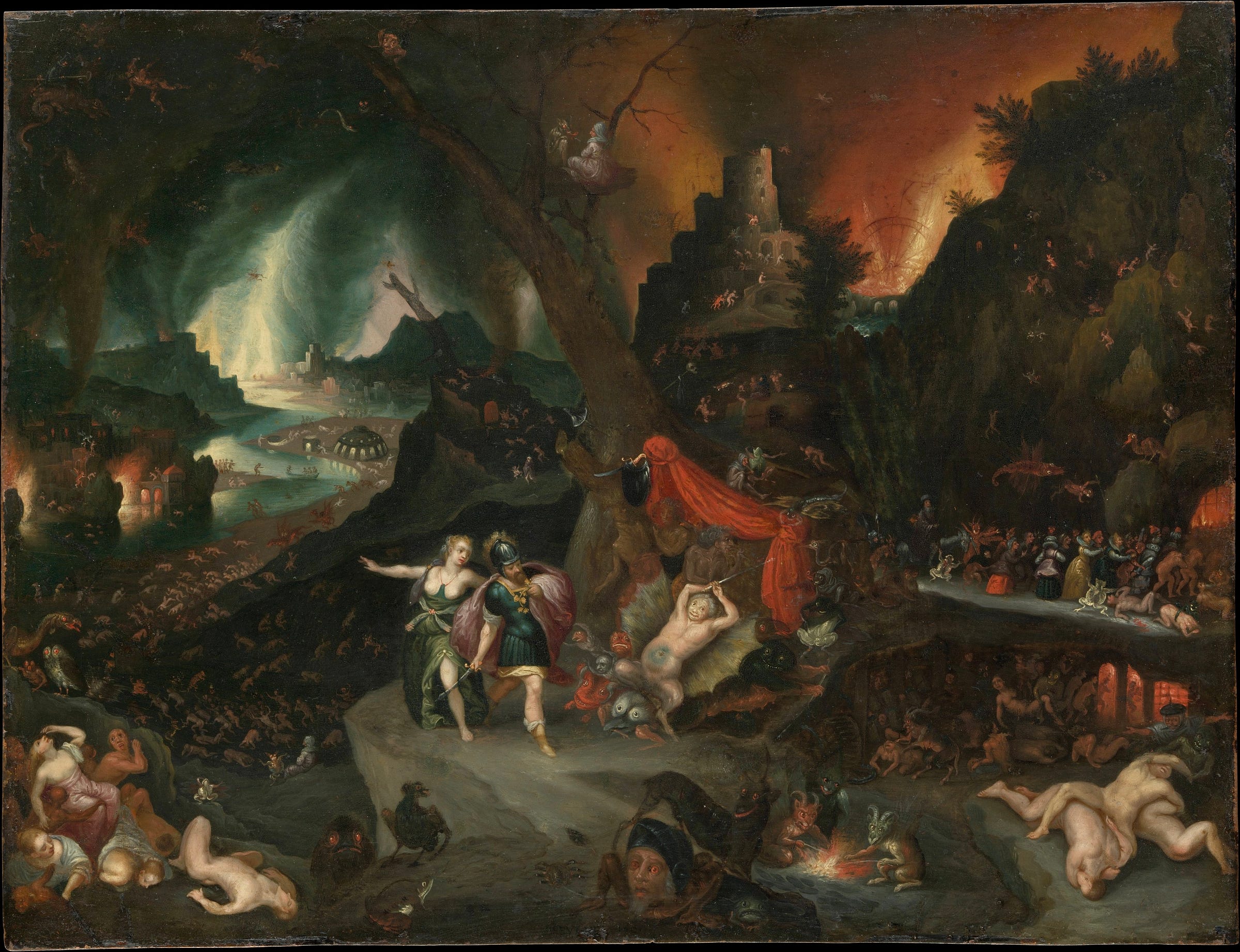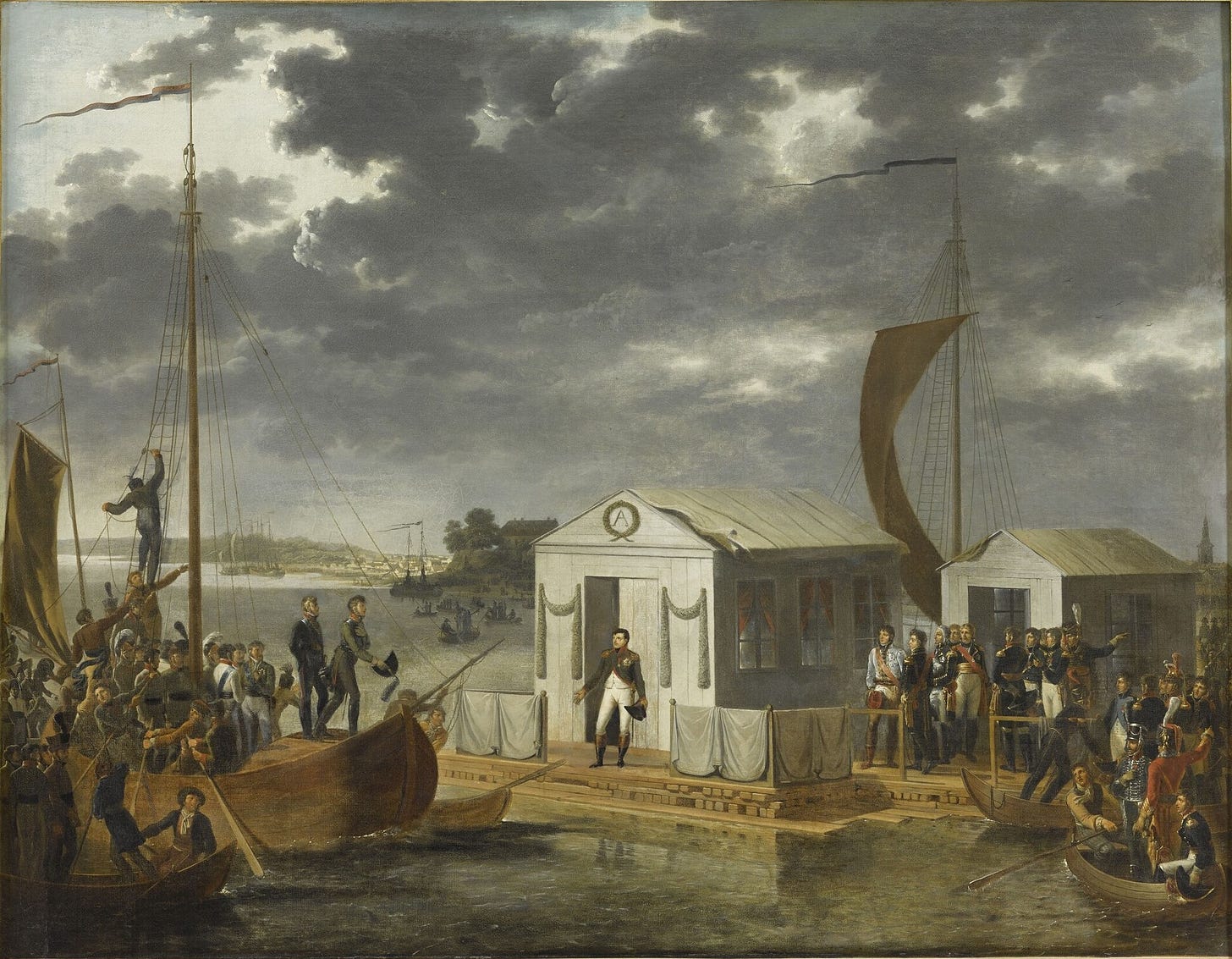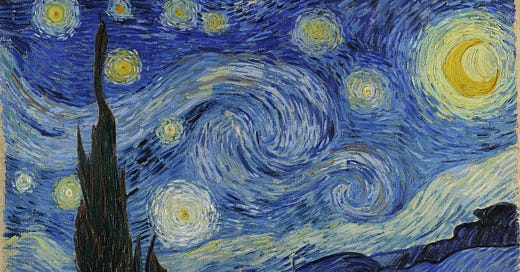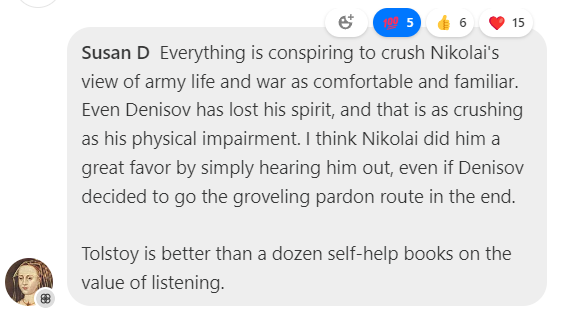A hundred days of War and Peace
War and Peace Week 15: Book 2 Part 2 Chapter 17 – Part 3 Chapter 2
Welcome to week fifteen of War and Peace 2024. This week, we have read Book 2 Part 2 Chapter 17 – Part 3 Chapter 2. Everything you need for this read-along and book group can be found on the main War and Peace page of Footnotes and Tangents. There you will find:
The reading schedule with links to daily chat threads for each chapter.
Weekly updates like this one.
These resources are free for all, thanks to the generosity of paying subscribers who support my writing and this slow book group. Paid supporters have access to All Tolstoy’s parties: every ball and banquet, reviewed, rated and ranked. You can also start your own discussion threads in the chat area. Thank you so much for your support!
This is a long post, and your email provider may clip it. It is best viewed online here.

How is everyone doing?
We have now been reading War and Peace for a little over one hundred days. We are almost a third of the way through the story, with so much still ahead of us. But by now, we have settled into the routine of dipping into this world, once a day, and the characters have already taken on the resemblance of old friends.
Let us know:
Who is your current favourite character?
Have you changed your opinion about any of the characters?
What was the biggest surprise in the first one hundred days?
What do you hope will happen in the rest of the book?
This novel is about many things, but right now, I am thinking about it as a book about friendship.
In the first one hundred chapters, Pierre, Andrei and Nikolai all endured challenges and experienced fleeting moments of clarity. But how to make these insights last? Pierre ran to the brotherhood of Masonry and Nikolai to the comradeship of army life. Andrei shunned the world.
But it is friendship that has really helped them. Andrei, listening to Pierre; Pierre stirring something in Andrei. Nikolai, devoting himself to help Denisov, who found home at the Rostovs as Pierre found a home at the Bolkonskys.
Pierre “digested his sufferings alone.” Andrei lived only for himself. And their minds ran in circles until they talked to one another and renewed their friendship.
But this book is about so many things: growing up, searching for meaning, searching for peace. Love, life, and happiness.
What do you think this book is about? Let me know in the comments.

Chapter 17: The land of the dead
Nikolai goes to visit Denisov in hospital. A doctor tells him that typhus is rampant, five doctors have died already, and Denisov is probably dead. In the soldier’s ward, Nikolai sees a delirious man desperate for water and a young soldier dead beside his comrade. “He’s been dead since morning,” the old soldier says. “After all we’re men, not dogs.”
Tangent: Nikolai’s disenchantment
The first time he went to war, he hoped for glory. The second time, he hoped for a simple life. War is neither. Now, Nikolai descends into the Underworld to find Denisov (something of a surrogate father in his found family of the regiment). But no one returns unchanged from the Land of the Dead. Here, he is confronted with how it ends: men neglected in an overwhelmed ward, dying of thirst, or just dying unnoticed. Nikolai has seen half the regiment succumb to sickness and death. This young man in the ward could be Nikolai in another life.

Footnote: ‘The bullets have spared you, do you want to try typhus?’
Nikolai was almost killed at the battle of Schöngrabern, but he is far more likely to die of disease than a bullet. In the 1850s, Florence Nightingale gathered statistics and created striking diagrams that showed that preventable disease was by far the biggest killer in the Crimean War. Leo Tolstoy was fighting on the other side of the war and must have seen for himself the hospitals where “death was so certain that soldiers suffering from fever… preferred to remain on duty,” going to the front, “hardly able to drag their legs.”
Florence Nightingale’s Coxcomb charts were truly revolutionary. After reforming hospital and nursing practices, she used statistics and this graphical representation to communicate to a wider audience the urgent need for change in medical care. Nightingale became the first female member of the Royal Statistical Society, and went on to collaborate with writer and reformer Harriet Martineau on many other projects.
Thank you
and others for bringing this fabulously important tangent to my attention.Chapter 18: Submission
In the officers’ ward, Nikolai encounters Tushin, the artillery captain who rescued him at Schöngrabern. He’s still got his pipe, but he is one arm down. Denisov is alive but in a foul mood. He wants to fight his case, but Tushin advises him to submit and petition the Emperor for a pardon. Rostov knows not to press the point and wound Denisov’s pride. But later, Denisov quietly hands Rostov the petition.
Tangent: The value of listening
Thanks
for drawing our attention to the theme of listening. Nikolai is learning to listen. Surely, that moment lost in Natasha’s voice was part of that journey. Pierre commended himself to Marya for his ability to listen to the pilgrims. And for all his failings, Andrei did what no other character could do, and which we readers struggled to do: listen to Pierre without laughing at him or interrupting.I wonder, who is the best listener in War and Peace? And who is the worst?

Chapter 19: Peace in our time
The war is over. At Tilsit, France and Russia make peace and become allies. Boris makes sure he is there for this historic meeting. He is having supper with a French officer when Nikolai arrives with Denisov’s petition. Rostov feels hostile and senses he is not wanted. Boris advises him not to give the petition to the Emperor, who “is very severe in such affairs.”
Nikolai • Boris • Alexander • Napoleon
Footnote: The Treaty of Tilsit
This chapter sets up startling contrasts. Nikolai goes from the horrors of the hospital to polite parties with the French, who are now our friends and allies. In Tilsit, the Russians recognise Napoleon as Emperor, and the two emperors embrace each other as friends. At the same time, the childhood friendship of Boris and Nikolai comes to an awkward end.
The Treaty of Tilsit ends the series of wars between France and Russia that have overshadowed the first section of War and Peace. Napoleon dominates the continent and has left Britain politically isolated on the edge of Europe.
Not all of the treaty was made public. Secret articles formed a closer alliance between France and Russia against Britain. There is an apocryphal story that British spies swam into the River Nemen to snoop on that pavilion meeting between Napoleon and Alexander. And in accordance with the terms of the treaty, Russia ceased trading with Britain and, in October, declared war.
Chapter 20: A man of honour
Nikolai leaves Boris thinking, “all is over between us.” He resolves to hand Denisov’s petition personally to Emperor Alexander. Rostov is in Tilsit without permission, out of uniform and on the worst possible day to submit a petition. He almost gives in to his fears, but manages to hand it to a cavalry general who shows it to Alexander. The emperor makes a public show of rejecting the petition: “The law is stronger than I.”
Tangent: Losing the war, winning at life
Nikolai returned to the army to be a “splendid man” in a world where he would not make “mistaken decisions.” Yet in Tilsit, he is doing everything “wrong” in the eyes of Boris and the military bigwigs. Nevertheless, his pursuit of a lost cause in the name of friendship demonstrates bravery, loyalty and perseverance. He may be losing according to the codes of society and the army, but I think he has begun to win at life.
In Tilsit, Napoleon awards his newfound friend Alexander the Cross of the Legion of Honour. It’s a symbolic gesture, signifying nothing. But in Tilsit, Nikolai loses a childhood friend in Boris and becomes a true man of honour to Denisov, and to us.

Chapter 21: Drowning your thoughts
Rostov witnesses Napoleon embrace Alexander as equals and reward a Russian soldier, while Denisov goes “punished and unpardoned.” Boris asks Rostov what’s the matter and he says “nothing”. But “terrible doubts rose in his soul.” He proceeds to drink heavily, and when others express their dissatisfaction with the peace, Nikolai rants and shouts down his own inner turmoil. Our duty is “to fight and not to think!”
Nikolai • Boris • Alexander • Napoleon
Rostov stood at that corner for a long time, watching the feast from a distance. In his mind a painful process was going on which he could not bring to a conclusion. Terrible doubts rose in his soul. Now, he remembered Denisov with his changed expression, his submission, and the whole hospital, with arms and legs torn off and its dirt and disease. So vividly did he recall that hospital stench of dead flesh that he looked round to see where the smell came from. Next he thought of that self-satisfied Bonaparte with his small white hands, who was now an Emperor, liked and respected by Alexander. Then why those severed arms and legs and those dead men?… Then again he thought of Lazarev rewarded and Denisov punished and unpardoned. He caught himself harbouring such strange thoughts that he was frightened.
Tangent: Simple, happy men
If Andrei and Pierre are complicated men, prone to introspection and self-analysis, Boris and Nikolai are the opposite: the simple men of War and Peace. Where Andrei and Pierre overthink life, Nikolai and Boris prefer an easy life. Boris plots out his climb to the top. Nikolai just wants to be happy.
This may make Nikolai a less compelling character than Andrei or Pierre. He is very ordinary and obvious. When his world comes crashing down, he doesn’t join a secret society or retreat into a quiet country life. He gets drunk and shouts down his doubts.
But many or most of us take Nikolai’s path through life. Others do a Boris and use their heads to get ahead. I know myself to be a ruminator, an overthinking idealist. So, many of Pierre and Andrei’s twists and turns feel familiar to me. But I also recognise that yearning in Nikolai: if only life were simple and we had no cause to think. And I think there is yet more to learn from Nikolai's quest for happiness.
And what of Boris? I have a harder time with Boris. As Andrew Kaufman writes1, his “self-focused, steely-eyed pragmatism” seems like a wise course in an uncertain world. He avoids the “painful confusion” Nikolai experiences in this chapter, or Andrei’s “bewilderment”, faced with the lofty sky. But,
Nor will Boris experience the deeper satisfaction of a life courageously and authentically lived. For while the turbulence of historical change eventually sweeps him into the dustbin of irrelevancy, Nikolai and Prince Andrei continue to evolve, their road of self-discovery paved with the shards of one broken ideal after another.
Congratulations on finishing Book Two, Part Two! As usual, here’s the merit badge courtesy of
, so that you can brag about your achievement!And now on to Book Two, Part Three…

Part Three
Chapter 1: Andrei’s Talking Oak
Two years have passed. Andrei has been living in the country, accomplishing everything on his estates that Pierre failed to achieve on his. He is reading a great deal and drawing up proposed reforms of the army. In spring, 1809, he visits his son’s estates, where he sees an old oak tree defying “spring, love, happiness.” Andrei identifies with the oak, arriving afresh at “his old conclusion”, not to begin anything but to “live out his life, content to do no harm, and not disturbing himself or desiring anything.”
Footnote: The oak tree
At the edge of the road stood an oak. Probably ten times the age of the birches that formed the forest, it was ten times as thick and twice as tall as they. It was an enormous tree, its girth twice as great as a man could embrace, and evidently long ago some of its branches had been broken off and its bark scarred. With its huge ungainly limbs sprawling unsymmetrically, and its gnarled hands and fingers, it stood an aged, stern, and scornful monster among the smiling birch-trees. Only the dead-looking evergreen firs dotted about in the forest, and this oak, refused to yield to the charm of spring, or notice either the spring or the sunshine.
This tree is one of the most important images in the book. But I won’t say anymore here, as we will return to Andrei’s oak next week.

Chapter 2: Natasha and the Night
Andrei visits Ilya Rostov on business at his house at Otradnoe. Rostov is living in the country as he always does: extravagantly, entertaining everyone with hunts, theatricals, dinners, and music. Andrei is struck by Natasha’s happiness: “Why is she so happy?” On a beautiful moonlit night, he overhears Sonya and Natasha looking at the moon. The scene stirs “youthful thoughts and hopes” in Andrei.
Andrei • Natasha • Sonya • Count Rostov
Footnote: Fly me to the moon
Have you ever tried to fly to the moon? Here is a footnote in an old copy of War and Peace, quoted in Yiyun Li’s Tolstoy Together:
Natasha’s fancy tallies with one Tolstoy himself had at the age of seven or eight. Under its influence he actually threw himself out of a window some eighteen feet from the ground. He was picked up unconscious. This resulted in a slight concussion of the brain, but after sleeping eighteen hours on end he recovered and experienced no further ill effect.
I have never paid the moon quite as much attention as I have these past three years. It’s one of the first things my son pointed at. He’s fascinated. And so he should be! To think that cratered ball of rock is hurtling up above us, reflecting the light of our distant star. Andrei has seen the loft sky, but he has yet to consider the beauty of the moon.
Thank you for reading
Thank you for reading and joining me on this slow read of War and Peace.
A quick reminder that this book group is entirely funded by its readers. So, if you have enjoyed this post and found it helpful, please consider a paid subscription to access the bonus reviews of all the parties of War and Peace and start your own discussion threads in the chat area. You can also donate to my tip jar on Stripe. Thank you so much for all your support.
And that’s all for this week. I would love to hear your thoughts in the comments. Have a great week, and I’ll see everyone here next Sunday for more War and Peace 2024.
In Give War and Peace A Chance: Tolstoyan Wisdom for Troubled Times. Chapter 4, Success.






Your commentary has been wonderful, Simon, and everyone’s contributions have added so much to the read-along. Andrei is my favorite main character this far into the book—maybe it’s his broody introspection and concentrated focus on keeping his head down, while recognizing the Big Things when forced to (by a bullet or by moonlight). I cant wait to see what happens. “Favowite” minor character is Denisov and I’m guessing it will be a little while before we learn his fate (bites fingernails). The women so far have changed the course of events on the home front while being mostly just thin brushstrokes—I’m curious to see how their stories evolve. I’m so glad to be reading this book at long last, and loving it. Thank you @SimonHaisell and everyone.
Quoted in the weekly summary, I feel famous!
My vote for best listener: Definitely Andrei, with Anna M. on his heels. She does her listening out of necessity and I am not sure if she hears what she doesn't want to hear, though.